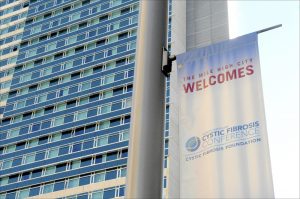5,000 Expected to Attend Cystic Fibrosis Conference, NACFC 2019, in Nashville
Written by |

Bottles of antibacterial hand sanitizer bearing the Cystic Fibrosis Foundation logo are distributed at NACFC 2018 in Denver. (Photo by Larry Luxner)
The Western Hemisphere’s largest gathering of experts in cystic fibrosis gets underway later this month in Nashville, Tennessee — site of the 33rd annual North American Cystic Fibrosis Conference (NACFC).
The Oct. 31–Nov. 2 event, sponsored by the Cystic Fibrosis Foundation (CFF), will attract more than 5,000 delegates to discuss a disease that affects between 70,000 and 100,000 people worldwide, including 30,000 in the United States alone.
That’s a far cry from 1987, when the first NACFC, in Toronto, had 300 participants.
Cystic Fibrosis News Today will cover this year’s meeting onsite, as it did last year in Denver. All three plenaries and other selected sessions will also be streamed live from Nashville’s Music City Center for those not able to attend.
This year’s NACFC program lists 203 educational sessions, consisting of 23 symposia, 30 workshops, 23 discipline group sessions, 12 brown bag luncheons, 81 roundtable luncheons, four pre-conference special classes, and 10 pre-conference short courses.
In addition, the program includes 802 posters, six thematic poster sessions, at least 50 corporate meetings, and more than 600 speakers and session leaders.
Specific sessions at NACFC 2019 cover a wide variety of subjects, including “Introduction to Airway Clearance Techniques,” “Taming the Dynamic Duo: Infection & Inflammation,” and “How Can We Minimize Lung Damage in CF From Infancy?”
Boyle to take helm at CFF
Among the event’s highlights are the plenary sessions planned for each of the conference’s three days.
On Thursday, Oct. 31, Marie Egan, MD, discusses “Emerging Technologies That Will Lead to CFTR Restoration in All People with CF.” On Friday, Nov. 1, Jane Davies, MD, speaks about “Entering the Era of Highly Effective Modulator Therapy.” And on Saturday, Nov. 2, Peter Mogayzel Jr., MD, PhD, will talk on “Evolution of the CF Care Model: Improvement, Innovation and Impact.”
This year’s NACFC is the last to be headed by CFF’s president and CEO, Preston W. Campbell, MD.
Campbell, who plans to retire at the end of 2019, has served in various leadership positions at CFF for more than 20 years, including the last four as CEO. Replacing him on Jan. 1 will be Michael P. Boyle, MD, currently a senior vice president for the CFF and former director of the Johns Hopkins Adult Cystic Fibrosis Program.
“Since its inception, the CF Foundation has been a powerful engine of progress in CF, shaping and powering advances in medical innovation and care that are helping people with CF to live longer, fuller lives than ever before,” Boyle said in a May press release announcing his promotion. “Still there is much to be done in our work to support best health for each and every person with CF, and illuminate the path to a cure.”
Boyle, who now oversees CFF’s Therapeutic Development Network of 92 academic research centers, is widely recognized for his clinical research on CFTR modulators. There’s no cure for the disease, which is caused my mutations in the cystic fibrosis transmembrane conductance regulator, or CFTR, gene.
At the moment, roughly 65% of U.S. patients have an approved therapy for their genetic cause of CF. More than 90% of them may benefit from the triple-combination therapies now in development by Vertex Pharmaceuticals, which has long dominated the market for CF medications.
Earlier this summer, the U.S. Food and Drug Administration (FDA) granted priority review to the Boston-based company’s new drug application for its triple combination — elexacaftor (VX-445) plus tezacaftor and Kalydeco (ivacaftor). This triple-combo is aimed at CF patients who cannot use Vertex’s other disease-modifying treatments or don’t benefit as intended.








